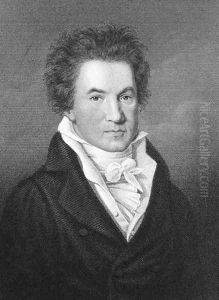Johann Gottfried Scheffner Paintings
Johann Gottfried Scheffner was born on February 8, 1736, in Königsberg, Prussia (now Kaliningrad, Russia). He emerged as a literary figure in the German Enlightenment, a period marked by an emphasis on reason, individualism, and a skepticism of traditional institutions. Scheffner's contributions, however, are often overshadowed by the luminaries of his time, such as Immanuel Kant, with whom he shared his hometown and intellectual environment. Despite this, Scheffner carved out his own niche, particularly in the realms of poetry and essay writing, reflecting the era's intellectual currents and the burgeoning movement toward romanticism.
Scheffner's early life was profoundly influenced by the cultural and intellectual climate of Königsberg, an important center for philosophy and the arts in the 18th century. He pursued his education with a focus on law, a common pathway for intellectuals of his era, which provided a foundation in logic and rhetoric, tools he would later apply to his literary endeavors. Over time, Scheffner developed a close relationship with Johann Georg Hamann, a key figure in the counter-Enlightenment movement, who significantly influenced his philosophical and literary outlook. This relationship positioned Scheffner uniquely, straddling the worlds of Enlightenment rationalism and the emotive, mystical elements that would prefigure romanticism.
Throughout his career, Scheffner engaged with a variety of literary forms, including poetry, essays, and critiques. His works often explored themes of morality, beauty, and human emotion, reflecting the broader philosophical debates of his time. Despite his prolific output, Scheffner's work did not achieve the lasting fame of some of his contemporaries. His literary style, marked by clarity, precision, and a deep moral concern, however, was appreciated by those in his intellectual circle.
Scheffner's contributions extend beyond his literary works. He served in various governmental and administrative roles throughout his life, which provided him with a stable career but also limited the time he could devote to his writing. In these roles, he was known for his integrity, efficiency, and commitment to the public good, qualities that mirrored the Enlightenment ideals of civic responsibility and progress.
Johann Gottfried Scheffner died on January 25, 1820, in Königsberg. While his literary contributions may not have garnered the widespread acclaim of some of his peers, his works remain a testament to the intellectual vibrancy of the German Enlightenment. Scheffner's life and writings offer valuable insights into the transitional period between Enlightenment thinking and the emergence of romanticism, reflecting the complexity and dynamism of this pivotal era in European intellectual history.
